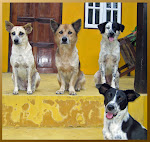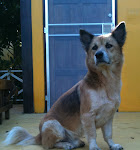 We have draconian dog laws. Dog on an empty beach at 7am with their responsible owner is fined more than parking in a pedestrian crossing in school zone! It does not make sense and such a fine does not take into account the REAL risk or public nuisance factor.
We have draconian dog laws. Dog on an empty beach at 7am with their responsible owner is fined more than parking in a pedestrian crossing in school zone! It does not make sense and such a fine does not take into account the REAL risk or public nuisance factor.Barking Mad has been researching for our public transport briefing/policy document. Are pets a public health risk; and if so, how? What about allergies, and how important it is to consider this with pets on public transport and in public spaces? I prefer logic to rhetoric, though the latter (think talk-back radio, MirandaNotDevine, media that makes an emergency out of everything) gets much more airplay. Often that rhetoric turns into public policy, and that is good for no-one in the long term.
I've had this data to hand for some time, and with hesitation, I now put it out to you, the reader. A child is at a greater risk of harm from their parent than from a dog. More children die at the hand of their parent than by a dog each year; a tragic but politically repulsive fact.
Each year about 300 Australian children (aged 0-14 years) are killed and 60,000 hospitalised by unintentional injuries (accidents). 75% of these come from just four causes: car crashes, pedestrian accidents, drowning and house fires. (Children under 5 and the elderly are at the greatest risk from a dog related injury, so appropriate measures are still required).
If we followed the numbers about risk logically we would ban the car, ban walking where we have cars, ban swimming pools and access to the ocean and water if we want to keep our children immune from risk. Although we have fenced most of our rail tracks in urban areas, we have yet to fence around every other risk. Logic is not the main driver of legislation.
Death resulting from dog-related injury is a rare event. During the seven year period 1997–2003, 11 deaths were registered as being due to this cause.
Reports on the number of lives saved, such as a relatively common event of a dog alerting an owner to the presence of a venomous snake, or barking at an intruder would be useful for comparison, but this data is not available. The story of a dog protecting a child from an Eastern Brown Snake can be found here and a similar story of a dog and an adult here.
It is important to consider the public health risks of pets, dogs in particular, in context. The media has been the dog’s worse enemy, creating public outcry that some short-sighted politicians have responded to with poorly thought out laws. Consider:
Abuse, Crime
- 6 people are killed, by people, each week – a total of 319 in 2006
- 465 people are assaulted by people each day; that’s 171,000 in 2006
- 50 people are sexually assaulted every day; 18,211 a year.
- 331 people are violently robbed each and every week
- In 2006, there were 207,446 incidents of violent crime, over 550 each day.
Vehicles
- 1616 people died on our roads in 2007 including 41 cyclists and 201 pedestrians. That is more than 4 deaths for each day of a year.
Other
- There are 1000 heat-related deaths a year.
- 400 people die a year from Asthma and in W.A. the Premier claimed that 150 people die a year while waiting for a hospital bed!
- In the most recent data, 134 babies died a year from Sudden Infant Death Syndrome (SIDS).
Manage the public health risks of pets in context. The media has been the dog’s worse enemy, creating public outcry that some short-sighted politicians have responded to with poorly thought out laws.








